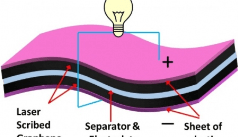LightScribe DVD drive makes novel supercapacitor electrodes
on

Supercapacitors can store substantially more charge than regular capacitors and they charge and discharge faster than batteries. Unfortunately they only have a fraction of the energy density of batteries. Improving the energy density of supercapacitors would represent a significant advance in energy storage technology, but this requires electrodes that not only maintain high conductivity but also provide higher and more accessible surface area than conventional activated carbon electrodes.
Researchers at UCLA have now produced laser scribed graphene electrodes that have these desired properties. The electrodes consist of an expanded network of graphene and have excellent mechanical and electrical properties, as well as exceptionally high surface area. The open network structure reduces the diffusion path of electrolyte ions, which is crucial for charging the device and also allows supercapacitors to deliver very high power in a short period of time.
To make the electrodes the researchers coated a DVD disc with a film of graphite oxide and used a standard LightScribe DVD drive to produce the graphene electrodes. Besides the wanted properties the new electrodes also maintain excellent electrochemical characteristics under high mechanical stress and thus hold promise for high power, flexible electronics.


Discussion (0 comments)